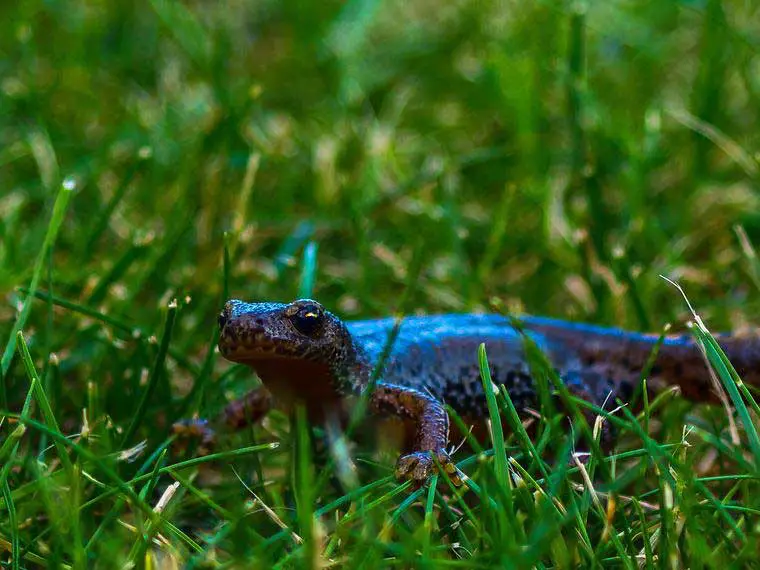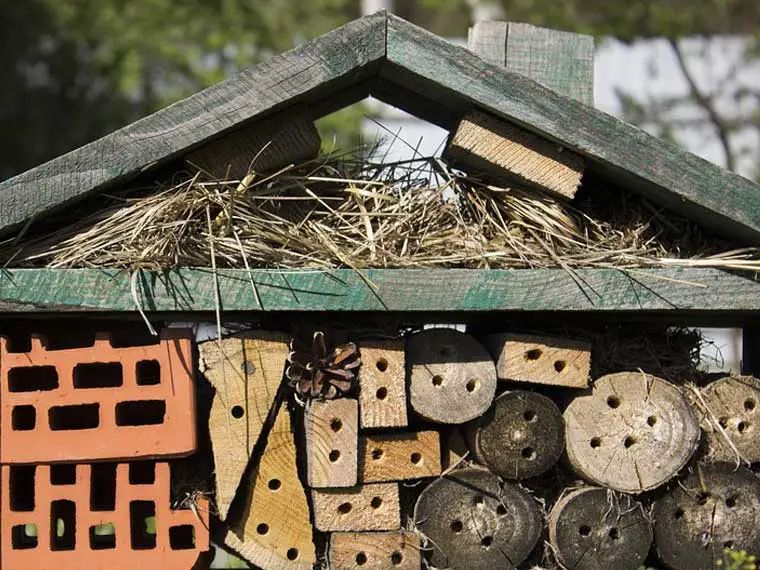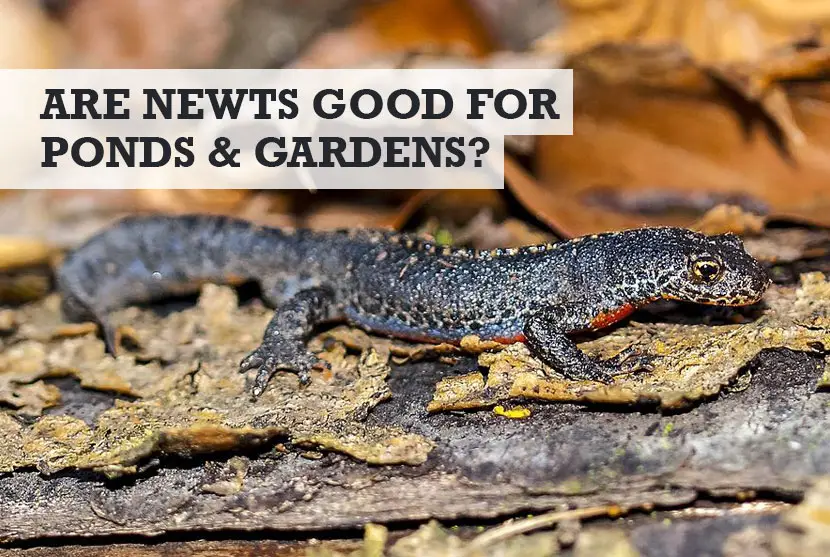Whether you’re considering encouraging newts to your garden, or have found that newts have made a home in your pond already, there’s always the same question that crops up: Are newts good for garden ponds?
The answer isn’t as cut and dry as you would hope, but if I can lay out the pros and cons for you, you can then make your own decision. Here’s the short answer first on whether newts are good for ponds and gardens…
Newts can be good for ponds and can be good for gardens. Newts prey on slugs and snails in gardens, meaning the rest of your plants and garden can flourish better. However, newts might not be good for your pond if you have smaller fish, as they compete for food.
But there’s also the chance that larger fish will flip this scenario and prey on the smaller newts. It’s not unusual for goldfish to eat small newts and eggs.
So, I appreciate that’s an exact answer, so let’s look a bit closer at whether newts are good for your pond and garden.
Are newts good for the garden and pond?
Here are reasons why newts can be good for garden ponds, but also some reasons why they might be bad for your garden. Once you’ve read these pros and cons, you can decide.
1. Newts can keep the pest population down
Newts can be good for gardens where you have problems with pests eating your plants and flower. As newts are land predators, they will naturally look to eat garden pests such as slugs and snails, which in turn will keep those pest numbers down to help your plants.
Newts can also be good at eating insects you might not want around your pond and garden such as craneflies.
Here’s a list of what is on the typical diet of a newt. If there’s a critter on there you don’t want in your garden, then newts could be good for your pond.
- Amphibian eggs
- Beetles
- Insects including ants, crane flies, mites, and mosquitos
- Leeches
- Slugs
- Small crustaceans such as shrimps
- Small invertebrates
- Spiders
- Springtails
- Snails
- Tadpoles
- Water snails
- Worms
2. Newts could prey on tadpoles
However, newts will be bad for your pond if you keep frogs. Newts like to eat tadpoles, particularly the smooth newt who will hunt them down as snacks.
If you want the two to co-exist together in your pond, create hiding places in the water where tadpoles can take cover. This can include rocks and pebbles to create tiny gaps, and aquatic planters.

3. Newts can attract other predators to your garden
Another reason to not want newts in your garden is the predators they can attract. If you have a thriving newt population by your pond, you will start to notice other animals coming to your garden that you might not want.
Animals that eat newts include:
- Badgers
- Birds including buzzards, eagles, herons, and storks.
- Grass snakes
- Hedgehogs
- Foxes
- Shrews
People have also witnessed large beetles eating baby newts once hatched from their eggs.
If you do want to attract and keep newts in your garden, be prepared for other predators to arrive.
Once newts have found your pond you can help protect them by providing plenty of places to hide both in the water and on land.
Are newts dangerous to goldfish?
One of the biggest considerations when debating whether newts are good for your pond is goldfish. Many people have them already in their pond, so the question of the two species co-existing together is important to understand.
You might have heard that newts and goldfish can’t live together. This isn’t necessarily true as it’s all down the size of the two species and the environment.
For example, if the goldish are bigger than the newts, the fish could eat them as well as competing for the food the newts want to get.
Then on the flipside, if the newts are bigger than the goldfish, the boot is on the other foot. Newts are carnivores after all.
What are newts good for?
If you’re still not convinced the newts are good for your garden and pond, then let me explain further. Newts are good for the overall ecosystem, courtesy of The Conversation.
“As they go about their daily lives, newts perform important functions which inadvertently benefit humankind. You could go so far to say that newts contribute to the overall ecosystem. For example, they will cycle nutrients from water to land and back again, thanks to their complex lifecycles. This helps with soil fertility, a service our overworked soils desperately need if we are to provide enough food for a growing population.”
Are newts good luck?
Whilst researching this article, I found a number of people on social media asking whether newts are good luck. I am not a superstitious person, so can’t say for certain how much faith you should put in my answer, but I will say yes, newts are good luck.
I say that purely from a ecological and nature perspective.
When I see newts coming back to my pond each year, I count myself lucky to be able to see these magnificent creatures. I think you should too, particularly given how some of them are endangered species.
Here’s what the UK Government legislate:
“Great crested newts are a European protected species. The animals and their eggs, breeding sites and resting places are protected by law. You may be able to get a licence from Natural England if you’re planning an activity and can’t avoid disturbing them or damaging their habitats (ponds and the land around ponds).”
FAQs on newts on in your pond
Can I put newts in my pond?
As I’ve established, newts can be good for your pond and garden in certain circumstances. But does that mean you should go and fish some newts out of one pond to put in yours?
Well, no… and let me explain why.
When you move newts from one pond to another, there’s a risk of cross-contamination of diseases and invasive plants.
You also don’t know whether the newts will want to be in your pond. As soon as they get put in it, they could try to leave and return home which puts them at risk of predators, road crossings, and other dangers.
Create the ideal environment for newts in your pond, and there’s a high chance they will find it themselves providing your garden is accessible to them. Here are some tips on what makes a pond attractive to newts.
- Leave small gaps in or under garden boundaries so newts can find your pond.
- Encourage plants around the pond to help protect newts from predators.
- Make sure the pond is near areas newts can hibernate in on land such as log piles, compost heaps, loose rocks, and nooks or crannies.
- Place the pond so that it also has some shade.
- Make sure there’s a slope down into the pond into a shallow area for newts to get in and out of.
- Don’t put fish in the pond as they will prey on the eggs and baby newts.
Do newts stay in a pond all year?
Even if your pond is good for news, it doesn’t mean they will stay in it all year. Newts breed in spring months, and this when they come to the pond. Once breeding is over, they will then look to hibernate, and so leave the pond.
That’s why newts don’t stay in a pond all year, but there are still likely close by. Newts like to hibernate in warmer places in winter such as log piles, ricks of wood, compost heaps, rockeries, and even bug hotels like the ones kids make.

Why have newts left my pond?
As I described above, it doesn’t matter how good your pond is for newts, during winter months you won’t find them in the water due to their hibernation habits. Newts will leave your pond around mid-October, making a return in February or March.
However, there are other reasons why newts have left your pond. These could include an outbreak of disease in the population.
Another reason for a lack of newts could be a change to the environment. For example, if new fencing has gone up locally, preventing them from accessing your pond and garden.
Conclusion
Newts are good for ponds and gardens. The help to enrich the ecosystem and could even bring other species into your yard. But the flipside of that is that they won’t always be good for other species you have… so you need to make the call on what’s best.
You might also like…
Image of a newt used in the header via https://pixabay.com/photos/alpine-newt-pig-amphibians-nature-2383009/

